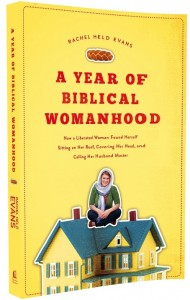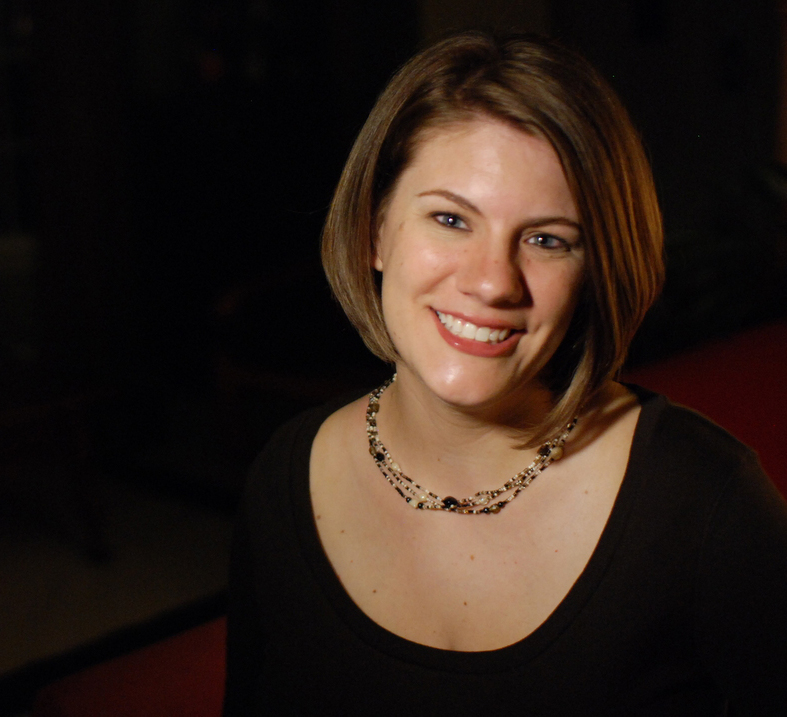A writer known for her philosophical explorations of faith and doubt, punctuated by down-to-earth self-revelation, humor, and truthfulness, is coming to campus.
Rachel Held Evans has attracted attention for her nuanced and accessible discussions about current issues in modern Christianity as the author of Evolving in Monkey Town (Zondervan, 2010) and The Year of Biblical Womanhood (Thomas Nelson, 2012) and a popular blog at www.rachelheldevans.com. She has promoted theological and political unity; fostered interfaith dialogue; celebrated powerful women; publicized social justice issues; and led fundraising campaigns for charity: water and World Vision, among other non-profit organizations.
Evans will speak at Eastern Mennonite University March 19 during a 10 a.m. university chapel service and also at 8 p.m. in Lehman Auditorium. Both events are free and open to the public. Campus maps indicating Lehman Auditorium location and parking availability (which is free), are available online.

Evans has been spotlighted by NPR, Slate, BBC, The Washington Post, The Guardian (UK), The Times London, The Huffington Post, and Oprah.com, in addition to speaking at retreats, conferences, universities, and churches of various denominations. In 2012, she was named one of Christianity Today’s “50 Women to Watch.” The just-published 2014 edition of Faith: History, Mystery and Challenges Revealed ranked Held Evans No. 4 on its list of leaders shaping the next generation of Christians.
Raised in an evangelical, but progressive household (her father is a professor of Christian thought and Biblical studies), Evans grew up – and still lives – in the small town of Dayton, Tenn., infamously nicknamed “Monkey Town” after the 1925 Scopes Trial that tested the state law prohibiting the teaching of evolution in public schools. In 2003, she graduated from Bryan College, a nondenominational evangelical Christian college, and embarked on a career as a writer.
Her first book, Evolving in Monkey Town, is aptly summarized by its subtitle: “How a Girl Who Knew All the Answers Learned to Ask the Questions.” In an interview, Evans recounts, “In my early twenties, after graduation from a Christian college, I began to question everything I’d been taught about origins, the Bible, about religious pluralism, about faith, about politics, about heaven and hell, and about what it means to be blessed by God.”
Her second book also wrestles with the teachings and conventions of her evangelical upbringing. By the age of 9, she writes, “I’d received a lot of mixed messages about the appropriate roles of women in the home, the church, and society, each punctuated with the claim that it was God’s perfect will that all women everywhere do this or that.”
The Year of Biblical Womenhood: How a Liberated Woman Found Herself Sitting on Her Roof, Covering Her Head, and Calling Her Husband “Master” chronicles the author’s year-long exploration of the Bible’s “formula” for womanhood. Each month, she delves into a different virtue, and attempts to follow the Bible’s teachings regarding women in her day-to-day life. A diehard Alabama football fan and naturally vociferous on just about any other topic, Evans unfortunately selects Gentleness as her first virtue (a godly woman has a “kind and gentle spirit,” according to Peter 3:4). To curb her tongue and cultivate civility, she tallies her transgressions with pennies in a “Jar of Contention,” leading eventually to a Proverbs-motivated punishment of roof-sitting (as mentioned in her subtitle). And that’s just in the first month of her radical experiment.
Since her first blog post in December 2007, Evans has written, sometimes controversially, about current issues among evangelical and progressive Christians, from gender roles to self-righteousness to homosexuality. She explores religious plurality in a post titled “Learn About Other Faiths (from the people who actually practice them).” Two of her most popular posts, about her personal search for a faith community to call home, are “15 Reasons I Left Church” and “15 Reasons I Stayed With the Church.”
Evans’ blog has flourished as a discursive space where believers, wonderers, and searchers congregate. She regularly fosters interfaith discussion. “One in Christ: A Week of Mutuality” was a week-long conversation about the dueling Biblical views of complementarianism and egalitarianism. In the series “Ask A…,” she facilitates discussion between readers and experts in various faith traditions (a series on the topic of hell featured Q & A with a Christian universalist, a traditionalist/exclusivist, and a conditionalist/annihilationist).
Evans’ visit is co-sponsored by the President’s Office, Provost’s Office, Campus Ministries, Albert Keim History Lecture Series, and the Intellectual Life Committee.
